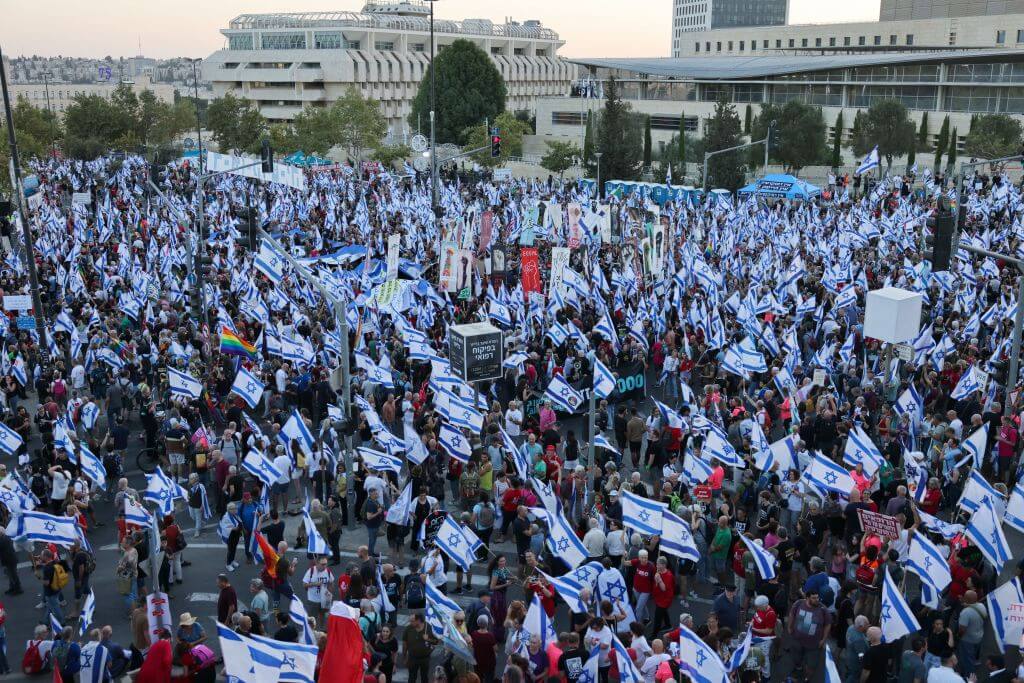Tens of thousands rally for democracy ahead of top court hearing on Netanyahu law overhauling judiciary
The pro-democracy protest took place outside the Supreme Court building in Jerusalem, roughly 13 hours before the historic hearing on the reasonableness standard

People attend a protest outside the Supreme Court in Jerusalem against the Israeli government’s judicial overhaul plan on September 11, 2023. Photo by Getty Images
This article originally appeared on Haaretz, and was reprinted here with permission. Sign up here to get Haaretz’s free Daily Brief newsletter delivered to your inbox.
Tens of thousands of pro-democracy protesters gathered on Monday evening outside Israel’s Supreme Court, a day before the justices convene to decide whether to overturn the bill revoking the reasonableness standard – a key part of the Netanyahu government’s judicial overhaul.
Several protesters who were holding horns and making their way to the event near the Supreme Court building were turned around by police.
After the protest ended, the police escorted the protesters as they marched toward Prime Minister Benjamin Netanyahu’s residence on Gaza street. One protester was arrested after lighting a flare.
Former Justice Minister Tzipi Livni spoke at the demonstration saying: “Just like the Supreme Court protects Israel’s citizens, we are here to protect the Supreme Court.” Livni pledged that “as long as they continue to hurt democracy, we will keep on fighting.”
Head of Israel’s Bar Association, Amit Becher, who also spoke at the demonstration, said: “We won’t let Kahanists from the Kohelet Policy Forum take over the Judicial Appointments Committee.”
Protest leaders told Haaretz on Sunday that the demonstrations taking place over the next few weeks will be shaped by the High Court’s decision. However, protest leaders believe the court won’t reach a decision over the next few days, and that at least some of the petitions will be accepted afterward.
On Tuesday, Israel’s High Court of Justice will hear petitions calling for the disqualification of July’s “Reasonableness Law,” the first legislative slice in the power grab known as the judicial overhaul.
Although Israel does not have a constitution, it has a limited number of higher-status Basic Laws, and what the Knesset passed in July is effectively a constitutional amendment that grants Netanyahu’s government legal immunity from “extremely unreasonable” decisions.
Suiting the unprecedented times, all 15 justices of the Supreme Court will sit in September to decide the fate of the law. All eyes will be on the court in Jerusalem, not least those of Israel’s extraordinary pro-democracy protest movement, which has vowed to protect the rule of law, while the prime minister serially refuses to state for the record that he will commit to the court’s ruling.
A message from our Publisher & CEO Rachel Fishman Feddersen

I hope you appreciated this article. Before you go, I’d like to ask you to please support the Forward’s award-winning, nonprofit journalism so that we can be prepared for whatever news 2025 brings.
At a time when other newsrooms are closing or cutting back, the Forward has removed its paywall and invested additional resources to report on the ground from Israel and around the U.S. on the impact of the war, rising antisemitism and polarized discourse.
Readers like you make it all possible. Support our work by becoming a Forward Member and connect with our journalism and your community.
— Rachel Fishman Feddersen, Publisher and CEO

























